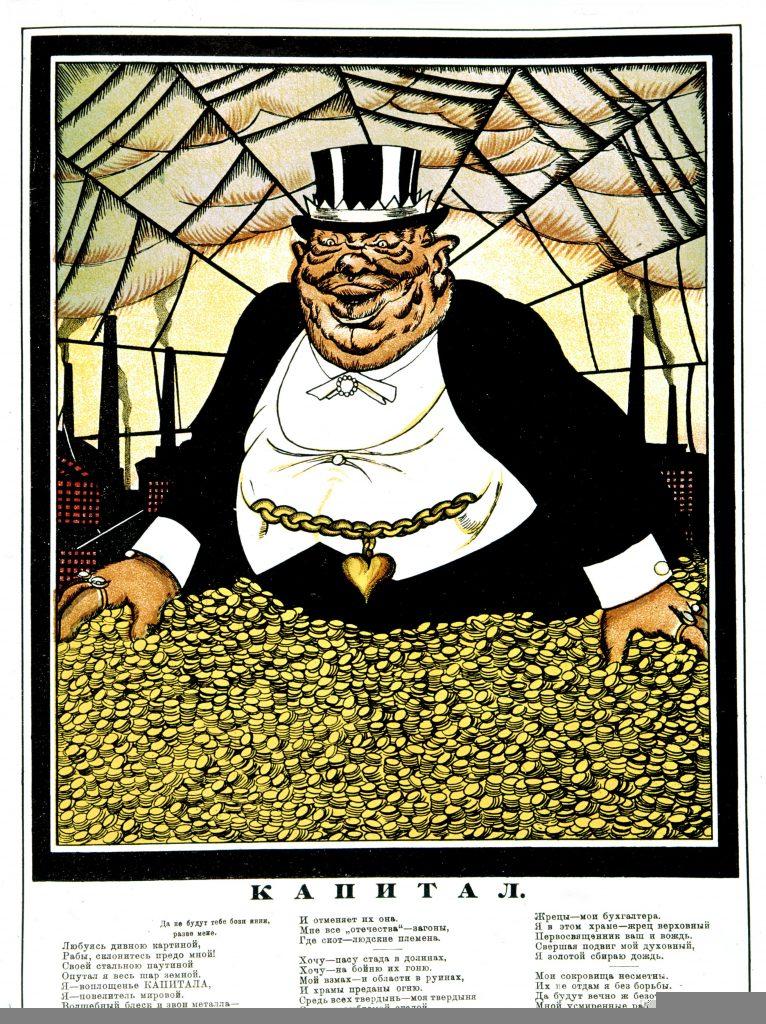One of the least recognized/discussed yet most blatant forms of propaganda is capitalist or bourgeois propaganda. There are two dimensions: what we might call economic propaganda – as a direct part of the capitalist production/”consumption” process – on the one hand, and the broader ideological-cultural hegemony of capital, on the other hand. The latter is produced and reproduced through the permanent diffusion and repetition of lies, myths, disinfo and dogmas about modern society, as well as the pro-bourgeois bias and framing within mainstream media and politics. In a word, this second dimension refers to the ideological domination of capital/the bourgeoisie within modern class relations and class struggle.
The biggest form of modern propaganda is arguably advertising in its various forms (mobile ads, display advertising, search engine marketing, etc) – which actually doesn’t stop at manipulating people’s choices when buying commodities, but in multiple ways since the 20th century (remember Edward Bernays’ “Torches of Freedom”?) has shaped socio-cultural norms and even people’s inner self-perception and subjective individuality or sense of self. In a 2000 essay, Marxist cultural theorist Raymond Williams called it “the official art of modern capitalist society.”
Advertising is a huge global industry, I’m sure most people have heard that what’s spent on it each year is staggering: German data platform Statista reports that since 2020 global ad spending has gone from $622.11 billions to over 800 $billions; the amount forecast for 2023 is $874.47 bil, and this could reach the $1 Trillion threshold as soon as 2026. Unsurprisingly, the USA and China are the two biggest markets (by ad spend, in 2023), but similarly to military spending (except it’s the govt for the latter, rather than private capital), the USA dwarfs the rest by spending more than the next ten countries combined. Digital advertising has obviously grown exponentially since the 1990s, and the bulk of global ad revenue goes to digital campaigns. Simultaneously traditional advertising mediums like newspapers, radio and outdoor boards/signs, have all declined, although TV advertising has been more or less static. I won’t get into much more detail here, but insurances are one of the biggest spenders worldwide. Historically, the biggest pioneers were of course the tobacco industry, which is precisely where Edward Bernays made his mark. Lastly, it’s worth noting that here like in most economic/capitalist industries, there’s a bunch of huge concentrations of capital that control a significant part of the market (though that doesn’t mean small ad companies/owners aren’t relevant!): some of the largest global marketing conglomerates are based in London (WPP plc), New York (IPG, Omnicom Group, and some subsidiaries of Irish consulting company Accenture), Paris (Publicis Groupe) and Tokyo (Dentsu Group Inc., Hakuhodo DY Holdings).
Capitalist “spin” also includes the countless propaganda and disinformation campaigns by firms and whole industries to lie to, gaslight and mislead the public and hide whatever they don’t want it to know. Again there are far too many examples, but let’s mention a few. In the 1920’s in Orange, New Jersey, dozens of women got radiation poisoning from painting watch dials with self-luminous paint (called Undark) that they were told was harmless. They were instructed to point their brushes on their lips in order to give them a fine tip, and ingested deadly amounts of radium, which ended up causing anemia, bone fractures, necrosis of the jaw (grimly, this came to be known as “radium jaw”), and more. Many factory workers died by the end of the decade and in the 1930s. Their employer was US Radium, a defense contractor supplying the US military with radioluminescent watches. The firm started a disinformation campaign with the cooperation of many doctors and dentists, producing a fraudulent report in response to the backlash about the factory’s working conditions, often blaming the deaths on syphilis to undermine the womens’ reputations.

A severe instance of “Radium jaw” from 1924
Both in the US and around the world, capitalist firms and industries have only expanded their propaganda – both commercial (ads/”consumer” manipulation) and political (covering up evidence of wrongdoing and health or environmental dangers, not to mention lobbying for self-interested legislation…) – since the time of the “Radium Girls”. The infamous propaganda campaign of the tobacco industry – beginning in the 1950’s – to deny the scientific evidence of the harms of smoking, became major model of capitalist industrial/commercial manipulation of science and medicine (e.g. climate change denialism). What they pioneered was what historians/scholars have called agnotology (needlessly fancy word, right? it’s just prop/disinfo): the strategic creation/production of ignorance (and doubt) through the suppression and/or subversion of (scientific/medical/etc) knowledge. One famous 1969 memo from the Brown and Williamson tobacco company explicitly outlines the aim and strategy of these ‘merchants of doubt’:
Doubt is our product since it is the best means of competing with the “body of fact” that exists in the mind of the general public. It is also the means of establishing a controversy. Within the business we recognize that a controversy exists. However, with the general public the consensus is that cigarettes are in some way harmful to the health. It we are successful in establishing a controversy at the public level, then there is an opportunity to put across the real facts about smoking and health. Doubt is also the limit of our “product”. Unfortunately, we cannot take a position directly opposing the anti-cigarette forces and say that cigarettes are a contributor to good health. No information that we have supports such a claim.
Other forms of capitalist propaganda include – and please notice the very loud quotation marks I’m adding here – “corporate branding”, “direct marketing”, “crisis communications”, the totalitarian construction and reproduction of a “corporate culture” wherein laborers are taught to be staunchly loyal to the firm/employer and even identify with it at a psychological/subjective level, and various forms of “reputation laundering” (e.g. greenwashing, ) and agenda-setting (e.g. sponsored op-eds in the media/press, and of course lobbying).
I should add that for me “capitalist propaganda” doesn’t refer to the apologetic accusation tankies and pro-China and campist authoritarians rely on today – check the tweets here for example – to do unpaid PR work for the CCP and other reactionary or populist bourgeois regimes that instrumentalize the rhetoric and aesthetics of pseudo-“anti-imperialism.”
The rightwing and pro-capitalist press is obviously a major part of reproducing and shaping capitalist apologetics and cultural conformism/ideological hegemony. Famously, both Marx and Lenin criticized The Economist over 100 years ago, the latter calling it “a journal that speaks for the British millionaires.” More recently, a book was written about it by Alexander Zevin. Zevin wrote that since 1843:
‘the “aristocracy of finance,” has indeed spoken through the Economist, first in Britain, and then also in America – not as the only, or purest, expression of liberalism, but as the dominant one, with the greatest global impact for 175 years’ (p.391).
- Zevin was also interviewed as part of Citations Needed’s episode on The Economist. Links: pod/transcript.
A range of rightwing and liberal intellectuals like Steven Pinker or Bill Gates (and I won’t compile a list of them, but there are dozens and hundreds more like him not just in the anglophone world but in all European countries – and I bet across the world honestly…) have made careers out of spreading a kind of pro-capitalist and eurocentric euphoric celebration of modernity. Adam Johnson and Nima Shirazi of the Citations Needed podcast called this the “neoliberal optimism industry”, and Jason Hickel “new optimism.” Pinker’s narrative about global poverty has been criticized empirically by Hickel, who has written several posts on his blog and some scientific papers about this. This is clearly a recurrent bourgeois coping mechanism – and a form of propaganda to legitimise the cruelty of modern society in the eyes of the public, so that nobody thinks of rebelling against it -, which we already saw with the “End of History” narrative at the end of the Cold War in the 1990s.
Kevin Carson has called the form of capitalist mythmaking that is spread by these liberal economists, rightwing (falsely called)”libertarians” (“libertarianism” is a socialist – originally anarchist – notion) and rightwing politicians/pundits in general, “capitalism’s just-so stories”:
Every system of class domination relies on a collection of myths — “just-so stories” — to present itself as natural and inevitable to those living under it, and to defend the wealth and power of the ruling classes as the result of merit. And they usually involve justifying the wealth of the ruling oligarchy as really being good for ordinary laboring folks. This is just as true — if not more so — for capitalism as for any other system.
These apologetic doctrines and theories are rooted in bourgeois political economy since the 19th century, especially after Adam Smith (ironically, one of the most prominent apologists of capitalism, but he was far more realistic about it than what came after him, starting with Ricardo himself…). A large part of Karl Marx’s critique of political economy is rooted in a critical deconstruction of the theoretical discourses of these economists, providing a radical critique of bourgeois social thought in general. Indeed, just as Marx predicted, the vast majority of economics since the end of the 19th century have been what he would call “vulgar economists”, dropping the already-limited scientific insight of the likes of Smith and Ricardo:
The vulgar economist does practically no more than translate the peculiar concepts of the capitalists… into a seemingly more theoretical and generalised language, and attempt to substantiate the validity of those conceptions.
Marx, Capital Vol. 3, ch 13.
As Kevin Carson mentions, one of the theoretical myths that has persisted from these vulgar economists is the classical wage-fund doctrine, “according to which the capitalist advances tools for workers to produce with, and wages to subsist on during the production process, out of pocket — and then pays himself back, along with compensation for his “abstention,” when the finished product is sold.” [Interestingly, Carson mentions another 19th c. critic of this kind of theory – not Marx who also debunked this – the early “free-market anarchist” (not right-“libertarian”) Thomas Hodgskin: in a nutshell, unlike this apologetic dogma:
All capital goods and all subsistence goods consumed during the production process are created by other workers. (…) All capitalists do is interpose themselves between the workers in various industries, and collect tolls on their advancement of their respective outputs to each other during the production process.
Kevin Carson: Capitalism’s Just-So Stories. C4SS.
This was just one example, but this ahistorical apologism for and naturalization of the modern social relations of production and domination (including colonialism) is the foundation of much of today’s capitalist propaganda. Indeed, most academic social theory/social science – especially so-called “economics”, of course -, is characterized by this failure to integrate the violence of social reality in their understandings and explanations of society. To dive into the theoretical nitty-gritty behind this, I highly recommend Simon Clarke’s Marx, Marginalism and Modern Sociology.
Further Resources/Readings
More from Citations Needed on the ideological and cultural propaganda of American capitalism:
- Episode 109: Self-Help Culture and the Rise of Corporate Happiness Monitoring. Links: pod/transcript.
- Episode 110: The Shiny-Object Psychology of American Capitalist “Innovation”. Links: pod/transcript.
- Episode 111: How “Small Business” Rhetoric Is Used to Protect Corporate America. Links: pod/transcript.
- Episode 131: The “Essential Worker” Racket — How ‘COVID Hero’ Discourse Is Used To Discipline Labor. Links: pod/transcript.
- Episode 135: The “Labor Shortage” Ruse: How Capital Invents Staffing Crises to Bust Unions and Depress Wages. Links: pod/transcript.
- Episode 150: How Economic Jargon and Cliches Make Cruel, Anti-Poor Policies Sound Sterile and Science-y (Part I). Links: pod/transcript.
- Episode 151: How Economic Jargon and Cliches Make Cruel, Anti-Poor Policies Sound Sterile and Science-y (Part II). Links: pod/transcript.
- Episode 159: The Anti-Worker Pseudo-Psychology of Corporate Personality Testing. Links: pod/transcript.
- Episode 164: Labor Union Depictions in Hollywood (Part I): From Demonized to Ignored or Mafia Plot Cliché. Links: pod/transcript.
